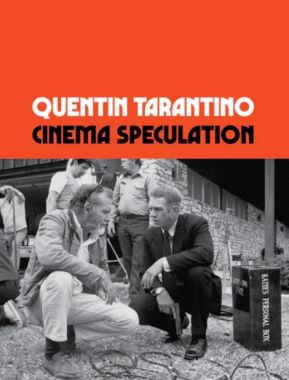From Grindhouse to Greatness:
Quentin Tarantino’s Ode to 70s Cinema
Quentin Tarantino‘s latest foray into the book publishing realm, Cinema Speculation, is an electrifying odyssey that mirrors the dynamism and distinctive aesthetic panache of his acclaimed cinematic oeuvre. This tome emerges as a multifaceted homage to the cinema of the 1970s—a decade not merely revered by Tarantino but also serving as a wellspring of his creative impetus. Interweaving elements of autobiographical reflection, astute film critique, and a tapestry of cultural historiography, Tarantino plunges into an examination of the cinematic constituents that have sculpted his auteur signature, all the while venerating an epoch of seismic shifts in the annals of Tinseltown. His fervent and meticulous exegesis distills the quintessence of these motion pictures, elevating them beyond mere longevity to become cornerstones in the edifice of filmic innovation, and proffers an intimate lens through which readers may discern the genesis and resonance of seminal works from this influential juncture.
Eschewing the conventional paradigms of film criticism and memoir, Cinema Speculation embraces a novel, variegated framework that fuses Tarantino’s personal vignettes with a profound dissection of the cinematic zeitgeist of the ’70s. This methodology enables Tarantino to intertwine his own cinematic journey as both spectator and creator with an expansive disquisition on the cultural and critical dimensions of the era’s cinema. His treatises on emblematic films such as Dirty Harry (1971) and The Getaway (1972) transcend mere synopses, evolving into contemplative ruminations on their indelible imprints upon American ethos and Tarantino’s own artistic trajectory. These dialogues exhibit his adeptness at situating a film within its temporal milieu, while concurrently drawing connections between its thematic and stylistic constituents, broader filmic movements, and his personal narrative.
A particular zenith within the book is Tarantino’s scrupulous deconstruction of Martin Scorsese’s Taxi Driver. This segment unfurls as a textured, multifaceted critique that not only parses the film’s narrative and visual fabric but also probes its incisive psychological and societal undercurrents. Tarantino articulates the manner in which Travis Bickle’s descent into the maelstrom of urban blight and psychological turmoil reflects the tumultuous social climate of 1970s New York. He extols Scorsese’s virtuosity in engendering an atmosphere rife with alienation and disquietude, harnessing pioneering cinematographic techniques and Bernard Herrmann’s disconcerting score to heighten the film’s suspenseful, ominous ambiance. Tarantino’s veneration for Taxi Driver is palpable as he elucidates its seminal influence on the genre of introspective narratives and its critical role in the metamorphosis of American film.
The narrative is further enriched by Tarantino’s candid and conversational prose, which invites the reader into a compelling colloquy on his filmic passions and inspirations. In the chapter “Little Q Watching Big Movies” he writes:
I found the iconic freeze-frame ending of Butch Cassidy and the Sundance Kid too obscure.
“What happened?” I remember asking.
“They died,” my mom informed me.
“They died?” I yelped.
“Yes, Quentin, they died,” my mother assured me.
“How do you know?” I shrewdly asked.
“Because when it froze, that was what that was meant to imply,” she patiently replied.
Again I asked, “How do you know?”
“I just know,” was her unsatisfying answer.
“Why didn’t they show it?” I asked, almost indignant.
Then, clearly losing her patience, she snapped, “Because they didn’t want to!”
Then I grumbled under my breath, “They shoulda shown it.”
And despite how iconic that image has become, I still agree with me, “They shoulda shown it.”
Additionally, his dissections of cinematic techniques and narrative ingenuities offer illuminating glimpses into the inner workings of film, aspects often merely alluded to in conventional critiques. While he occasionally indulges in personal asides and cinematic trivia, these interludes infuse the discourse with authenticity and fervor, revealing his profound adoration and esteem for the medium.
Moreover, the compendium includes a comprehensive critique of Brian DePalma’s oeuvre, spotlighting another pivotal influence on Tarantino’s cinematic lexicon. He delves into DePalma’s penchant for suspense and complex narrative architecture, Blow Out and Carrie in particular. DePalma’s signature visual stratagems, including the use of split screens and slow-motion sequences, have left an indelible mark on Tarantino’s directorial approach. This section not only underscores DePalma’s impact on Tarantino but also accentuates DePalma’s groundbreaking contributions to the cinematic vernacular of the 1970s.
Tarantino also pays homage to the film critic Kevin Thomas, whose critiques in the Los Angeles Times profoundly shaped his cinematic palate and analytical acumen. He attributes a considerable measure of his filmic education to Thomas’s prose, which he discusses with immense admiration and deference. This tribute underscores the pivotal role critics play in molding both public perception and the creative compass of filmmakers, highlighting the symbiotic relationship between critique and creation within the cinematic sphere.
Furthermore, Tarantino’s exposition of lesser-known films and unsung directors augments Cinema Speculation with additional layers of depth. His capacity to illuminate these cinematic treasures and articulate their significance within the wider film canon not only educates the reader but also positions Tarantino as a champion of the art form. His elaborate expositions invite readers to explore and value these works, thereby expanding their cinematic literacy and appreciation for the medium’s diverse narratives.
Cinema Speculation is an imperative read that masterfully encapsulates the effervescent and transformative essence of 1970s cinema through the perspective of one of its most ardent contemporary acolytes. Quentin Tarantino presents more than mere film critique; he interlaces a rich mosaic of anecdotes, reflections, and analyses that render a vibrant tableau of a defining epoch in film history. This volume is a quintessential acquisition for cinephiles and cineastes, submitting profound insights into the artistry and influence of filmmaking, as narrated by one of the industry’s most emblematic luminaries.
Cinema Speculation
Quentin Tarantino
Harper Perennial (HarperCollins) | 400 pages | non-fiction
released on March 26, 2024
to purchase ($21.00), visit HarperCollins


